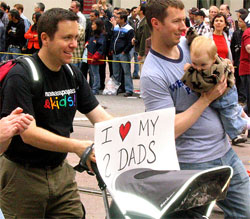 By Jenny Jisoo Mok, Episcopal High School, Grade 9
By Jenny Jisoo Mok, Episcopal High School, Grade 9
June 6, 2011
Hundreds and thousands of children in orphanages are waiting to be picked up by a happy family. Some of them, if their luck runs out, have to stay there for the rest of their lives. It sounds like a grim fate, but they are in much better shape compared to those who are not even accepted by orphanages for the lack of rooms. On the surface, it seems that the desperate situation was due to a shortage of adopters. In reality, however, it happens because the society forbids some motivated people – namely, homosexuals – from adopting.
In Virginia, gay-adoption is currently illegal. No matter how well established and supportive they are, a same-sex couple cannot adopt a child. Most states, in fact, practice the same law. Even if some states such as California and Washington allow gay-adoption, the gay couple has to go through many complicated procedures to claim a child. For example, they need to endure crime history checks, take first-aid classes, and take multi-week training courses before even holding a child in their arms.
In contrast, many states allow ex-alcoholics, psychotics, and even criminals—as long as they are not homosexuals—to adopt a kid. What message are these states sending?–that being a homosexual is worse than doing drugs or abusing people?
Jeff Streed, a Latin teacher at Episcopal High School, asserts, “Every state, unfortunately, deals with the issue differently and thus it can be viewed as a regional concern. Some states, however, assumed inappropriately on what makes proper parents, and it surprises me that they forbid adoption by homosexuals.”
Gay adoption opponents argue that homosexual parents would cause confusion of sexual identity for their child and eventually lead to him or her becoming a homosexual. This assumption is not based off fact or study. Streed adds, “From my knowledge of Greek and Latin cultures, I know that the notions of intimacy are affected by culture. For example, in Sparta, the concept of homosexuals was common and norm. Thus, having homosexual parents would make a difference in children’s perspectives toward some relationships, but not in their actual sexual preferences.”
What gives states the right to prevent homosexual people from becoming parents and take away the chances for numerous orphans to have a loving family? How can the state ignore their needs and leave them to live in a hopeless condition? It seems that we, as a nation, need to care more genuinely about the children’s welfare and focus less upon the politics of the matter.


